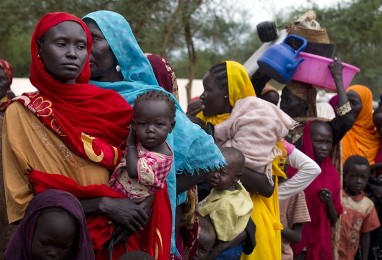More Sudanese refugees arriving in S. Sudan: UNHCR
September 15, 2016 (KHARTOUM) – The United Nations refugee agency (UNHCR) said it registered and assisted 298 new arrivals from Sudan’s South Kordofan state last month, bringing the number of new arrivals since 1 January 2016 to 9,291.

“They reported hunger, aerial bombardments and ground attacks as the main reasons for fleeing to South Sudan,” it said in a bulletin Sudan Tribune obtained.
It, however, said that due to the ongoing rainy season, the number of new arrivals has significantly dropped compared to previous months, with renewed influxes expected to start again as the rainy season comes to an end in November.
In August, UNHCR said, it relocated 502 refugees from Yida to Ajuong Thok, including 275 new arrivals and 227 refugees who had previously registered in Yida, bringing the total number of Sudanese relocated to Ajuong Thok since January to 13,585.
“This includes 9,182 new arrivals and 4,403 refugees who had previously registered in Yida. As many as 3,935 have been relocated from Yida since May 2016,” it further stated.
“The current population of Yida is 59,292, while Ajuong Thok hosts 39,464 refugees,” adds the report.
Meanwhile, in Kaya camp, UNHCR received and assisted 48 Sudanese new arrivals from Blue Nile State, bringing the total number of new arrivals in Maban so far this year to 472.
This group of new arrivals, the agency stressed, came from Sudanese villages of Bulang, Mufu, Mayak, and Soda and told UNHCR staff on the ground that they fled their homes due to aerial bombardments, intimidation and harassment by armed groups, arbitrary arrest and detention of young men and women as well as lack of food, education and health care facilities in their respective villages.
In Maban county for instance, UNHCR said it closely worked with the public prosecutor to ensure due process of law in two separate sexual gender-based violence incidents perpetrated by humanitarian workers against minors.
“For the first time in Maban, the local judiciary convicted the perpetrators to imprisonment, in disagreement with the opinion of the traditional court wanting the cases to be dealt with thorough customary practices and private arrangements between the families of the victims and the families of the perpetrators,” said UNHCR.
In Yusuf Batil camp, the refugee agency and its partner, Danish Refugee Council reportedly conducted training for sector-based camp committees, targeting 42 refugees and host community members on human rights and protection aspects.
(ST)
